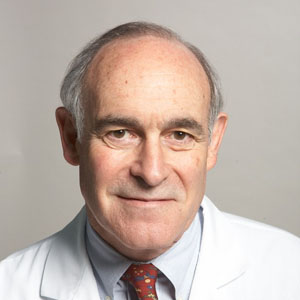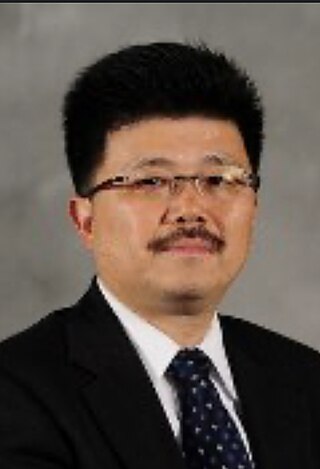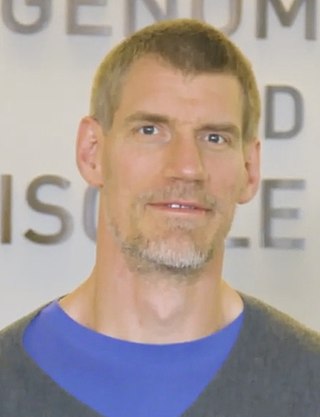Biomedical text mining refers to the methods and study of how text mining may be applied to texts and literature of the biomedical domain. As a field of research, biomedical text mining incorporates ideas from natural language processing, bioinformatics, medical informatics and computational linguistics. The strategies in this field have been applied to the biomedical literature available through services such as PubMed.

Russ Biagio Altman is an American professor of bioengineering, genetics, medicine, and biomedical data science and past chairman of the bioengineering department at Stanford University.
Evan Flatow is an American orthopaedic surgeon-scientist. As of 2023, he is President of Mount Sinai West, part of the Mount Sinai Health System. He published more than 400 book chapters and peer-reviewed articles. Flatow is indicated as principal or co-principal investigator for nine research grants and listed on six patents for influential shoulder implant systems.

Lawrence E. Hunter is a Professor and Director of the Center for Computational Pharmacology and of the Computational Bioscience Program at the University of Colorado School of Medicine and Professor of Computer Science at the University of Colorado Boulder. He is an internationally known scholar, focused on computational biology, knowledge-driven extraction of information from the primary biomedical literature, the semantic integration of knowledge resources in molecular biology, and the use of knowledge in the analysis of high-throughput data, as well as for his foundational work in computational biology, which led to the genesis of the major professional organization in the field and two international conferences.

Robert J. Desnick is an American human geneticist whose basic and translational research accomplishments include significant discoveries in genomics, pharmacogenetics, gene therapy, personalized medicine, and the treatment of genetic diseases. His translational research has led to the development of the enzyme replacement therapy (ERT) and the chaperone therapy for Fabry disease, ERT for Niemann–Pick disease type B, and the RNA Interference Therapy for the Acute Hepatic Porphyrias.
William K. Oh, is an American medical oncologist, academic and industry leader and expert in the management of genitourinary malignancies, including prostate, renal, bladder and testicular cancers.

Ming-Ming Zhou is an American scientist who focuses on structural and chemical biology, NMR spectroscopy, and drug design. He is the Dr. Harold and Golden Lamport Professor and Chairman of the Department of Pharmacological Sciences. He is also the co-director of the Drug Discovery Institute at the Icahn School of Medicine at Mount Sinai and Mount Sinai Health System in New York City, as well as Professor of Sciences. Zhou is an elected fellow of the American Association for the Advancement of Science.
Translational bioinformatics (TBI) is a field that emerged in the 2010s to study health informatics, focused on the convergence of molecular bioinformatics, biostatistics, statistical genetics and clinical informatics. Its focus is on applying informatics methodology to the increasing amount of biomedical and genomic data to formulate knowledge and medical tools, which can be utilized by scientists, clinicians, and patients. Furthermore, it involves applying biomedical research to improve human health through the use of computer-based information system. TBI employs data mining and analyzing biomedical informatics in order to generate clinical knowledge for application. Clinical knowledge includes finding similarities in patient populations, interpreting biological information to suggest therapy treatments and predict health outcomes.

Eric Emil Schadt is an American mathematician and computational biologist. He is founder and former chief executive officer of Sema4, a patient-centered health intelligence company, and dean for precision medicine and Mount Sinai Professor in Predictive Health and Computational Biology at the Icahn School of Medicine at Mount Sinai. He was previously founding director of the Icahn Institute for Genomics and Multiscale Biology and chair of the Department of Genetics and Genomics Sciences at the Icahn School of Medicine at Mount Sinai.
The Icahn Genomics Institute is a biomedical and genomics research institute within the Icahn School of Medicine at Mount Sinai in New York City. Its aim is to establish a new generation of medicines that can better treat diseases afflicting the world, including cancer, heart disease and infectious pathogens. To do this, the institute’s doctors and scientists are developing and employing new types of treatments that utilize DNA and RNA based therapies, such as CRISPR, siRNA, RNA vaccines, and CAR T cells, and searching for novel drug targets through the use of functional genomics and data science. The institute is led by Brian Brown, a leading expert in gene therapy, genetic engineering, and molecular immunology.

Andrew Kasarskis is an American biologist. He is the Chief Data Officer (CDO) at Sema4. He was previously CDO and an Executive Vice President (EVP) at the Mount Sinai Health System in New York City and, before that, vice chair of the Department of Genetics and Genomic Sciences and Co-director of the Icahn Institute for Genomics and Multiscale Biology at the Icahn School of Medicine at Mount Sinai. Kasarskis is known for taking a network-based approach to biology and for directing the first medical school class offering students the opportunity to fully sequence and analyze their own genomes.
Ethylin Wang Jabs is an American physician and scientist with expertise in medical genetics, pediatrics, and craniofacial biology. She is currently vice chair of the Department of Genetics and Genomic Sciences at the Icahn School of Medicine at Mount Sinai Medical Center. Jabs is also a professor in the departments of developmental and regenerative biology and pediatrics at Mount Sinai and an adjunct professor in pediatrics, medicine, and surgery at the Johns Hopkins School of Medicine. Her research and clinical practice have focused on development genetics and patients with birth defects.
Joseph D. Buxbaum is an American molecular and cellular neuroscientist, autism researcher, and the Director of the Seaver Autism Center at the Icahn School of Medicine at Mount Sinai. Buxbaum is also, along with Simon Baron-Cohen, the co-editor of the BioMed Central journal Molecular Autism, and is a member of the scientific advisory board of the Autism Science Foundation. Buxbaum is a Professor of Psychiatry, Neuroscience, and Genetics and Genomic Sciences. He is also the Vice Chair for Research and for Mentoring in the Department of Psychiatry at the Icahn School of Medicine at Mount Sinai.

Gene set enrichment analysis (GSEA) (also called functional enrichment analysis or pathway enrichment analysis) is a method to identify classes of genes or proteins that are over-represented in a large set of genes or proteins, and may have an association with different phenotypes (e.g. different organism growth patterns or diseases). The method uses statistical approaches to identify significantly enriched or depleted groups of genes. Transcriptomics technologies and proteomics results often identify thousands of genes which are used for the analysis.

Giulio Maria Pasinetti is the Program Director of the Center on Molecular Integrative Neuroresilience and is the Saunders Family Chair in Neurology at the Icahn School of Medicine at Mount Sinai (ISMMS) in New York City. Pasinetti is a Professor of Neurology, Psychiatry, Neuroscience, and Geriatrics and Palliative Medicine at ISMMS.
The Resilience Project is a project, undertaken by the Icahn School of Medicine at Mount Sinai in collaboration with Sage Bionetworks.
Patrizia Casaccia is an Italian neuroscientist who is the Director of the Neuroscience Initiative of the Advanced Science Research Center at the City University of New York (CUNY), as well as a Professor of Neuroscience, Genetics & Genomics, and Neurology at the Icahn School of Medicine at Mount Sinai. Casaccia is a pioneer in the study of myelin. Her research focuses on understanding the neurobiological and neuroimmune mechanisms of multiple sclerosis and to translate findings into treatments. Casaccia co-founded the Center for Glial Biology at Mount Sinai and CUNY and is one of the Directors of the center.
Biomedical data science is a multidisciplinary field which leverages large volumes of data to promote biomedical innovation and discovery. Biomedical data science draws from various fields including Biostatistics, Biomedical informatics, and machine learning, with the goal of understanding biological and medical data. It can be viewed as the study and application of data science to solve biomedical problems. Modern biomedical datasets often have specific features which make their analyses difficult, including:
Teri E. Klein is an American professor of Biomedical Data Science and Medicine at Stanford University. She is known for her work on pharmacogenomics and computational biology.
Daniel Richard Masys is an American biotechnologist and academic. He is an Affiliate Professor of Biomedical and Health Informatics at the University of Washington.








